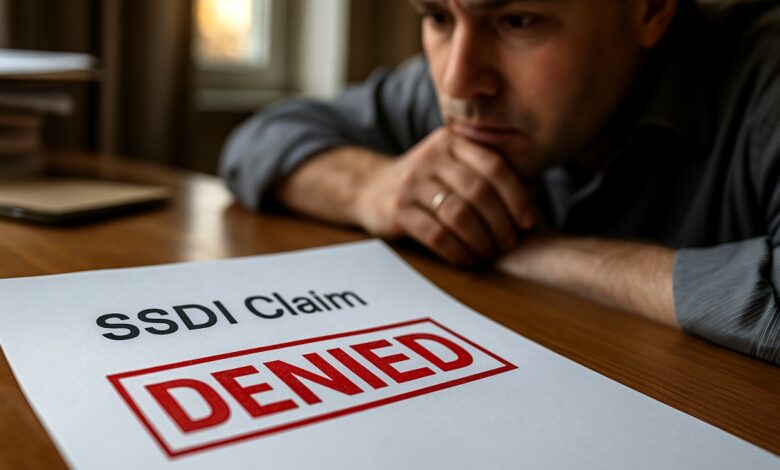Why Social Security Disability Claims Get Denied Often
Need help with Social Security Disability in Lafayette, IN? Learn why most claims are denied and how local disability lawyers can improve your approval chances.

Navigating the process of applying for Social Security Disability benefits can be really difficult, particularly in Lafayette, Indiana, where residents face the same challenges as applicants nationwide. According to the Social Security Administration, approximately 67% of initial Social Security Disability Insurance (SSDI) applications are denied, meaning that thousands of applicants across Indiana—including many from Tippecanoe County—receive denials each year. With Lafayette’s diverse workforce spanning manufacturing at facilities like Subaru, healthcare positions at IU Health Arnett and Franciscan Health, retail, and service industries, workers from all sectors may find themselves needing disability benefits when health conditions prevent them from working.
Denials leave hundreds of applicants frustrated and uncertain about their next steps. Engaging with Lafayette social security disability lawyers can guide you through this intricate process and enhance your chances of approval. Knowing why these applications get denied allows applicants to prepare themselves and become better candidates for approval.
Incomplete Documentation
This is one of the biggest reasons why claims are denied. Applicants need to submit extensive medical documentation that supports their claim. These documents should clearly show the extent of the disability. Rejection due to missing documents or incomplete medical history is common. Including all relevant medical evidence can absolutely change the outcome.
Lack of Medical Evidence
Poor documentation in medical records can also be a reason for the denial of a claim. The Social Security Administration needs detailed documentary proof that work capacity is impaired by the disability. A claim can fail if a doctor’s notes are vague or don’t emphasize limitations. Applicants are advised to work closely with healthcare providers to obtain accurate and comprehensive medical records.
Failure to Follow Treatment
People who fail to follow through on prescribed treatments may be denied. Unless somebody has a very good reason not to, the administration expects applicants to follow medical advice. According to the Social Security Administration, failure to follow prescribed treatment without good cause can be grounds for denial. If you fail to do that, it may indicate that the limitation is not as severe as claimed. Staying in touch with doctors is key, as is documenting why any treatment plans are not followed—whether due to side effects or other health challenges.
Income Exceeding Limitations
Social Security Disability pays benefits only to individuals who cannot work substantially. If income exceeds the permitted cap, an application may be rejected. This is the case even if the job is part-time or temporary. During the application process, applicants must be aware of income limitations and make sure income does not exceed these limits.
Short-Term Disabilities
The administration evaluates disabilities that are predicted to last for at least one year or to result in death. Denial is a common response to short-term conditions. Applicants must prove that the condition meets the duration requirement. This can include medical records and treatment documentation that prove the disability has lasted or will last for an extended period.
Failure to Cooperate
Refusal to cooperate during the application process can also be grounds for denial. This could mean missing scheduled appointments or not providing requested information. Working with the administration is necessary for your claim to be successful. Showing up for all necessary evaluations and responding quickly to requests can demonstrate cooperation and commitment to the claim.
Insufficient Work Credits
Work credits, accumulated through working, determine eligibility for Social Security Disability benefits. An applicant who does not have enough work history may have their claim denied. Make sure you understand the requirements and have earned enough credits before applying.
Previous Denials
If you submit a new claim without addressing the reasons behind previous denials, it might also face rejection. Applicants must review old applications critically to identify the problems and correct them before reapplying. Fixing past mistakes improves the chances of getting approved.
Miscommunication or Errors
Mistakes in the application may result in rejection. Answering questions incorrectly or providing inaccurate information can undermine a claim. A thorough and careful review of the application is essential, and seeking help when needed is wise. All documents submitted must contain accurate and clear information to avoid trouble.
Inadequate Legal Representation
Some applicants proceed without legal representation. An experienced attorney may assist in navigating the process, organizing documentation, and building a strong case. Professional legal help can significantly improve the chances of approval.
Conclusion
For applicants, it’s important to understand why Social Security Disability claims are frequently denied. Identifying and addressing these issues—such as obtaining complete medical documentation, following prescribed treatments, and having proper legal representation—can significantly improve the likelihood of approval. You can ensure the best possible handling of the process by thoroughly preparing, cooperating with the administration, and seeking professional help.











